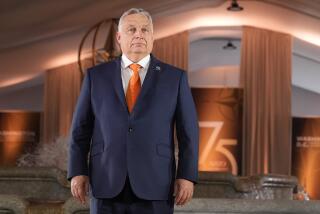THE REYKJAVIK SUMMIT : As Talks Adjourn, Mood Turns Cool as Icelandic Night
- Share via
REYKJAVIK, Iceland — From the moment the two leaders stepped slowly and sullenly out of the mansion in the dusk and cold of evening after their prolonged final meeting, it was obvious that something vital had drained out of them.
Gone were the warm smile of Mikhail S. Gorbachev, the jaunty wave of Ronald Reagan, the friendly banter between the two, the joking replies to reporters’ leading questions, the show of affection. Instead, they shook hands stiffly, soberly, rapidly, like two distant relatives who do not enjoy each other’s company.
No one could have any doubt that their summit conference had been disappointing. But the extent of the disappointment and of the failure was not really clear until almost half an hour later when Secretary of State George P. Shultz briefed White House correspondents and, by television, everyone else in the little city of Reykjavik about what had happened.
Shultz, red-eyed and fatigued after attending almost all the sessions during the two days, opened in an odd way, by praising President Reagan effusively. “The President’s performance was magnificent,” he said, “and I have never been so proud of my President as I have been in these sessions and, particularly this afternoon.”
Some puzzled listeners thought this sounded like the prelude to the announcement of a grand success and, for a moment, believed that the sullen images of Reagan and Gorbachev leaving the white mansion known as Hofdi House minutes earlier had been no more than some North Atlantic mirage.
A Clear Disaster
But then Shultz began talking about reaching not sweeping agreements but “sweeping potential agreements” and praised “the agreement that might have been.” And it soon became clear that the conference had been a disaster--a failure of such magnitude that Reagan and Gorbachev could not even agree to hold the Washington summit that had been pledged for later this year.
President Reagan will make his report to the nation about the conference tonight, but he looked very tired and obviously dismayed Sunday night when he stopped to talk with American servicemen at the Keflavik naval air base 30 miles from here before flying on to Washington.
Gorbachev was in a different, stranger mood. He held a 90-minute news conference minutes after the Shultz briefing. His aides, who had been upbeat, even beaming about the triumphal prospects of the news conference earlier in the day, had suddenly turned glum.
The Soviet leader himself was somber as he described the failure, putting the blame for it on the stubbornness of Reagan and what he termed Reagan’s inability to make a decision without checking with his aides. “The President is not free,” Gorbachev said. “He does what the military-industrial complex tells him.”
Yet, the more Gorbachev talked, the more he seemed to persuade himself that perhaps the conference had not been a total failure, perhaps the near agreements were something that could be built on in the future. He urged the American people and Reagan to reflect on how close they had come to an agreement.
From the start, it had been obvious that this summit conference in the isolated town of Reykjavik would be far different from the first summit of Reagan and Gorbachev in Geneva.
Partly because Geneva is a large and well-known European city, partly because Reagan and Gorbachev had never met each other before, the first summit almost seemed to quiver with excitement and theatrics. Journalists recorded every smile, every nod, every handshake, every turn of wit of the two leaders. The two spent a good deal of time together, even taking a stroll by the lake in a light snowfall during one session.
Celebrities Pour In
Celebrities and pressure groups poured into the city, to advocate a cause or protest a policy. They staged parades and demonstrations, interrupted news conferences and generally made themselves a part of the summit action. Reagan and Gorbachev encouraged the histrionics by staging a final session in which they ceremoniously stood by while their ministers signed a communique describing the summit.
There was nothing wrong with this approach, since everyone knew that the Geneva summit was no more than a get-acquainted session, a chance for the leaders to test each other’s chemistry and personality. It was a theatrical event.
The mood at Reykjavik was far different. The Icelandic government, fearing trouble, kept out as many of the pressure groups as possible. In a sense, it was right to do so. This was a summit of little ceremony and few theatrics.
Reagan and Gorbachev did not meet alone very often but had their top aides with them. There were no strolls by the seaside or against the backdrop of snow-streaked fiords. Newsmen still monitored the smiles and handshakes of the leaders, not because they seemed to have importance but only because, until the end of the conference, there was little else to report.
The two leaders had obviously come to work hard and try to reach agreements. After the morning session Sunday, when most people thought agreements were close, Reagan was asked if he and Soviet leader Gorbachev were near agreement. Reagan shrugged and held his hands out as if to ward off the question. No one took the gesture seriously then, but they should have. Failure would come a few hours later.
More to Read
Sign up for Essential California
The most important California stories and recommendations in your inbox every morning.
You may occasionally receive promotional content from the Los Angeles Times.










